Judi Lynn
Judi Lynn's JournalRightwing Chilean newspaper accused of 'apology for Nazism' over Goring article
Germany embassy condemns El Mercurio for Sunday piece and says ‘no room to justify or minimise his horrific role’
John Bartlett in Santiago
Mon 25 Oct 2021 12.53 EDT
Chile’s main conservative daily newspaper has been accused of publishing “an apology for Nazism” after running an illustrated article commemorating the life of the German war criminal Hermann Göring.
After El Mercurio published the article on Sunday, the German embassy in Santiago expressed its concern, highlighting Göring’s many crimes.
. . .
El Mercurio is the modern incarnation of Chile’s oldest newspaper, founded in the port city of Valparaíso in 1827.
It received CIA funding during the socialist government of Salvador Allende (1970-73) to undermine the president’s economic reforms. The newspaper supported the 1973 coup which deposed Allende and ushered in General Augusto Pinochet’s dictatorship, and published consistently in favour of the military government until the return to democracy in 1990.
More:
https://www.theguardian.com/world/2021/oct/25/chile-newspaper-el-mercurio-hermann-goring
~ ~ ~
Documenting U.S. Role in Democracy’s Fall and Dictator’s Rise in Chile

A phone in the exhibition “Secrets of State: The Declassified History of the Chilean Dictatorship” at the Museum of Memory and Human Rights in Santiago, Chile. Visitors can pick up the receiver to hear a recreation of a conversation between former President Richard M. Nixon and his national security Adviser, Henry Kissinger.Credit...Tomas Munita for The New York Times
By Pascale Bonnefoy
Oct. 14, 2017
SANTIAGO, Chile — An old rotary phone rings insistently.
Visitors at a new exhibition at the Museum of Memory and Human Rights here in Santiago who pick up the receiver hear two men complain bitterly about the liberal news media “bleating” over the military coup that had toppled Salvador Allende, the Socialist president of Chile, five days earlier.
. . .“Our hand doesn’t show on this one, though,” one says.
“We didn’t do it,” the other responds. “I mean, we helped them.”
. . .
Nearby, copies of the front pages of dozens of newspapers from the Pinochet era hang from a panel simulating a kiosk. They were all published by the conservative media empire El Mercurio, which received at least $2 million from the C.I.A. The records in the exhibition also profile Pinochet, trace intelligence gathering on brutal state-sponsored repression and detail how the Reagan government abandoned Pinochet to his fate in 1988, fearing a further radicalization of the opposition.
“These documents have helped us rewrite Chile’s contemporary history,” said Francisco Estévez, director of the museum. “This exhibit is a victory in the fight against negationism, the efforts to deny and relativize what happened during our dictatorship.”
. . .
“To see on a piece of paper, for example, the president of the United States ordering the C.I.A. to preemptively overthrow a democratically elected president in Chile is stunning,” Mr. Kornbluh said. “The importance of having these documents in the museum is for the new generations of Chileans to actually see them.”
https://www.nytimes.com/2017/10/14/world/americas/chile-coup-cia-museum.html

How Factory Farms in America Ignite Fires in Brazil
By Devatha P. Nair October 25, 2021
Chances are that the fires burning in the Amazon did not cross our minds as we sat down to a breakfast of scrambled eggs on a Sunday morning. Nor did we think of the jaguar with her blackened paws lying helplessly asphyxiated in the Pantanal wetlands as she tried to outrun multiple fires, amidst the 700,000 hectares ablaze, or the plight of the burnt caiman, found with his mouth agape in a last desperate scream as the flames engulfed him.
The fact remains: The fires burning in Brazil’s Amazon, Pantanal, and Cerrado biomes are done so on purpose by livestock farmers to turn dense forest into pasture and soybean crops. These fires put millions of wild animals in harm’s way, and they are directly connected to the growing demand for meat and dairy products. The fires in Brazil are part of a global problem, one which highlights the direct link between deforestation and loss of ecosystems with dietary choices made thousands of miles away. Above all, the blazes reiterate the sheer unsustainability of animal agriculture and tragedy within our current food systems.
“Seeing the impact of these fires on the environment and wildlife is devastating,” says Joao Almeida, Executive Director of World Animal Protection (WAP), Brazil. “We have seen baby deer with their legs burned, animals such as monkeys and jaguars completely carbonized, and others with their paws burnt, completely dehydrated or starving.”
According to Brazil’s National Institute for Space Research (INPE), the fires have already destroyed homes and farms and sent humans to hospital for respiratory problems. And while the fires leave behind the charred remains of vertebrate and invertebrate animals, they may have irrevocably destroyed the habitat for millions of other animals.
More:
https://sentientmedia.org/how-factory-farms-in-america-ignite-fires-in-brazil/
What's With All the Imperial Spanish Flags in Peru (and Elsewhere)?
BY ANDREA MONCADA
OCTOBER 25, 2021
A nationalist turn among Peru’s right-wing parties — and some sectors of the population — points to increasing polarization.
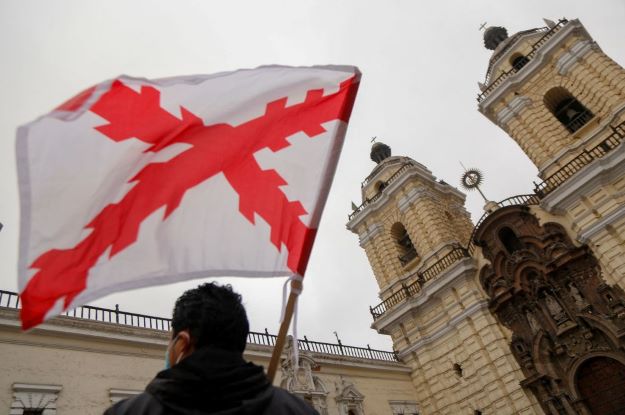
A marcher carries the Cross of Burgundy flag in Lima on October 12.
Gian Masko/AFP via Getty
Since June, Peruvians have been witnessing an unusual sight in the streets of Lima. Groups of people have been spotted bearing a flag with a little-known symbol called the Cross of Burgundy — it made its first appearance during post-election rallies against purported election fraud by current President Pedro Castillo and his party, Perú Libre. More recently, on October 12, which is both Spain’s “Día de la Hispanidad” and Peru’s Indigenous Peoples and Intercultural Dialogue Day, the Peruvian Patriot Society (Sociedad Patriota del Perú) carried the flag in front of the statue of Christopher Columbus in Lima’s historical center. The group claimed to be protecting the statue from demonstrators against the legacy of colonialism and violence perpetrated during the Spanish conquest against indigenous populations.
The Cross of Burgundy — a symbol that pays homage to the Spanish monarchy and to the “civilizational crusade” it carried out in its former colonies — is not a common image in Peruvian society or politics. Its sudden appearance has raised many eyebrows, especially considering how the legacy of colonization has been newly questioned and criticized in many Latin American countries in the last few years, including Peru. In 2019, Mexican president Andrés Manuel López Obrador caused a stir by sending letters to King Felipe VI of Spain and Pope Francis asking them to apologize for the atrocities committed against indigenous peoples during the conquest of the Americas. And at his swearing-in ceremony in July, Pedro Castillo promised to “break with colonial symbols” and criticized Spain’s exploitation of Peru’s mineral resources during the colonial period — in front of Spain’s King Felipe VI, who had attended the ceremony.
The sudden appearance of this symbol is indicative of a change within Peru’s right-wing parties: They are adopting a nationalist discourse that emphasizes the country’s Spanish heritage, Catholicism, and ties to the Iberian Peninsula. The leader of the conservative Fuerza Popular party, Keiko Fujimori, recently participated in Viva 21, an event held by Spanish far-right party Vox with the purpose of “enriching Spanish culture.” Fujimori called the event a “symbol of Hispanic unity against the socialism of the 21st century” and said that she shared their defense of life and family. Three congressmembers of Avanza País, the party of conservative economist Hernando de Soto, have signed the Carta de Madrid, a document sponsored by Vox that claims to unite the “Iberosphere” against the global communist threat. Another group of parliamentarians from Renovación Popular (led by Rafael López Aliaga) also met with Vox representatives in Lima in September.
. . .
The apparent rise of nationalism in Peru is not an isolated occurrence in Latin America and is more easily understood as part of a wave of far-right sentiment in the region. Supporters of this tendency argue they are pushing back against the threats of communism and indigenismo. Many prominent political figures, including Eduardo Bolsonaro, son of Brazilian president Jair Bolsonaro; former Colombian presidents Andrés Pastrana and Álvaro Uribe; and Chilean politician José Antonio Kast, have participated in events held by Vox, an undoubtedly racist, nativist and xenophobic party which is currently undertaking an effort to unite the more conservative sectors of Latin America in an offensive against “globalism” and the left.
More:
https://www.americasqu.e/whats-with-all-the-imperial-spanish-flags-in-peru-and-elsewhere/
Judges Present Book on Crimes of the Argentinean Dictatorship

Photographs of the victims of the Argentine military dictatorship. | Photo: Twitter/ @lajornadaonline
Published 21 October 2021
During an event that will take place at the "Memory Museum" in Buenos Aires on Thursday afternoon, Sergio Torres and Cecilia Brizzio will present the results of the investigation carried out on the human rights violations committed at the Navy Higher School of Mechanics (ESMA) during the last Argentine military dictatorship (1976-1983).
From 2003 to 2019, Torres headed the Court that investigated crimes against humanity in Argentina. Accompanied by Supreme Court Judge Brizzio, he wrote a book showing details of the legal processes that allowed justice to the memory of those who were murdered and tortured at the ESMA.
The Plaza de Mayo Grandmothers President Estela de Carolotto, the Anne Frank Center Director Hector Shalom, and State Department Cultural Affairs Director Martin Granovsky will also attend their book's presentation.
"This book chronicles our effort to shed light on some of the crimes the dictatorship committed. But it also shows that it is possible to fight the consequences of such a massacre with the legal tools available," Torres said.
More:
https://www.telesurenglish.net/news/Judges-Present-Book-on-Crimes-of-the-Argentinean-Dictatorship-20211021-0011.html?utm_source=planisys&utm_medium=NewsletterIngles&utm_campaign=NewsletterIngles&utm_content=26
So many people in the years after brutal dictatorships have used terms like "human rights violations" to describe terrorizing, non-stop tormenting, torturing, unrelenting psychological destruction of human beings. That term simply doesn't begin to cover the evil deliberately acted out upon these defenseless people, does it? For so many years US Americans never knew any US allies, or, heaven forbid, American citizens were involved in any of these moral, spiritual, criminal crimes. It was ALL swept under the rug, or whitewashed.
Blinken says the US has plans to curb Amazon deforestation
Saturday, October 23rd 2021 - 09:13 UT

Blinken said the full plan was to be disclosed “in the coming days”
US Secretary of State Antony Blinken Thursday announced while on an official trip to Colombia that his country would launch a regional pact to reduce deforestation throughout the Amazon. Blinken's words came a few weeks before the UN environmental summit in Glasgow, Scotland, and were regarded as an effort to mitigate one of the leading causes of global warming.
“We can take great steps to deal with the climate crisis,” Blinken said after a tour of the Botanical Garden in Bogotá. Blinken also explained his country would finalize “in the next few days” a “new alliance specifically focused on fighting deforestation associated with the extraction of raw materials.”
The initiative will provide “useful information to companies so that they can effectively reduce their dependence on deforestation.” It will also include financial support for protected areas inhabited by indigenous peoples and small farmers, it was reported. Tropical forests are crucial for the environment because they retain large amounts of carbon, responsible for global warming.
During his visit to Colombia, Blinken refused to answer a question about the criticism against Brazil's President Jair Bolsonaro, who has been accused of encouraging agribusiness in forest areas and also of instigating the murders of environmentalists in the country with the largest territory in Amazonia.
More:
https://en.mercopress.com/2021/10/23/blinken-says-the-us-has-plans-to-curb-amazon-deforestation
Chile is at the Dawn of a New Political Era
OCTOBER 22, 2021
BY VIJAY PRASHAD
“It feels like we are at the end of an era,” Bárbara Sepúlveda tells me on October 12, 2021. Sepúlveda is a member of Chile’s Constitutional Convention and of the Communist Party of Chile. The era to which Sepúlveda refers is that of General Augusto Pinochet, who led the U.S.-backed coup in 1973 that overthrew the popularly elected government of President Salvador Allende. During the Pinochet era, the military acted with impunity, and the left was assassinated and sent into exile—while big business (both Chilean and foreign) received all the blessings of the dictatorship. That’s the era that has slowly been sputtering to a halt since Pinochet’s removal in 1990 and since the Chilean people voted to throw out the dictatorship’s Constitution of 1980 and write a new one.
Neoliberalism was born in Chile, as the popular slogan goes, and it will die in Chile. This slogan seems to have come true with the ending of the Pinochet era.
But Sepúlveda is not sure about what comes next. “Everybody knows everything is uncertain,” she says frankly. “That is an opportunity to begin a new era.” The first decade and a half after Pinochet’s removal seemed bleak. Then, in 2006, a cycle of student protests rattled the country. These were led by young students, whose black-and-white school uniforms gave the protests a name—La Revolución Pingüina, or the Penguin Revolution. The young people demanded a new national curriculum as well as a reduction in public transportation fares and examination fees. When the government failed to deliver on these demands, a second cycle of protests mobilized in 2011-2013 with the same demands. Their leaders—including Camila Vallejo of the Communist Party and Giorgio Jackson of the Democratic Revolution—are now important figures of the left project in Chile. Once more in 2011-2013, the students were met with a stalemate, with the Constitution of 1980 being a barricade to their ambitions.
A third cycle of student protests began in early October 2019 following a hike in public transportation fares. The “penguins” led a campaign of fare evasion (under the slogan ¡Evade!). The protesters were met with a harsh repression campaign including violent clashes with the Chilean police. On October 18, the right-wing government, led by President Sebastián Piñera, issued a two-week state of emergency, authorizing the deployment of the Chilean Army against the protests, which only intensified. The violence used to suppress the protests resulted in the emergence of the slogan Piñera Asesino (Piñera the assassin) among protesters and their supporters.
Sepúlveda says of the 2019 mobilization that the breaking point on “October 18 moved the axis [of Chilean politics] further to the left.” Although the third cycle of protests had initially been a response to the transportation fare hike, the government’s reaction made it clear that the country faced much deeper underlying structural issues including, Sepúlveda says, “overwhelming inequality” and corruption. Sepúlveda, a lawyer who co-founded Chile’s association of feminist lawyers (ABOFEM) in 2018 and was its executive director during the 2019 protests, saw at the time that changing these structural issues could not be done from within the existing system; at the very least, the country needed a new constitution and a more progressive government. And so the protest expanded to include the demands of the feminist movement and the Indigenous movement, pushing for broader economic and social changes to address the inequality at the root.
More:
https://www.counterpunch.org/2021/10/22/chile-is-at-the-dawn-of-a-new-political-era/
Sami people ask Danish queen to return sacred witchcraft trial drum
Norwegian indigenous minority seek permanent ownership of artefact seized after 17th-century trial
Helen Russell in Jutland
Wed 13 Oct 2021 05.23 EDT

A Sámi drum from the British Museum in London. Most of the few remaining drums are in European hands. Photograph: Trustees of the British Museum
Norway’s Sámi people are asking for a sacred drum confiscated by Denmark after a witchcraft trial in 1691 to be returned to them permanently, and they have asked the Danish queen for help.
The drum belonged to a Sámi shaman, Anders Poulsson, who was arrested and imprisoned, according to court records. It was confiscated and became part of the Danish royal family’s art collection before being transferred to Denmark’s National Museum in 1849.
Since 1979, the drum has been on loan from the Danes to the Sámi museum in Karasjok, Norway. The loan agreement expires on 1 December and the drum is expected to return to Denmark. But the Sámi people want it back.
The Sámi Museum in Karasjok sent a request to the Danish National Museum earlier this year to formally take over ownership of the drum and the president of the Sámi parliament, Aili Keskitalo, has issued a statement to Norwegian and Danish press demanding the drum’s return.
More:
https://www.theguardian.com/world/2021/oct/13/sami-people-norway-ask-danish-queen-to-return-sacred-witchcraft-trial-drum
~ ~ ~
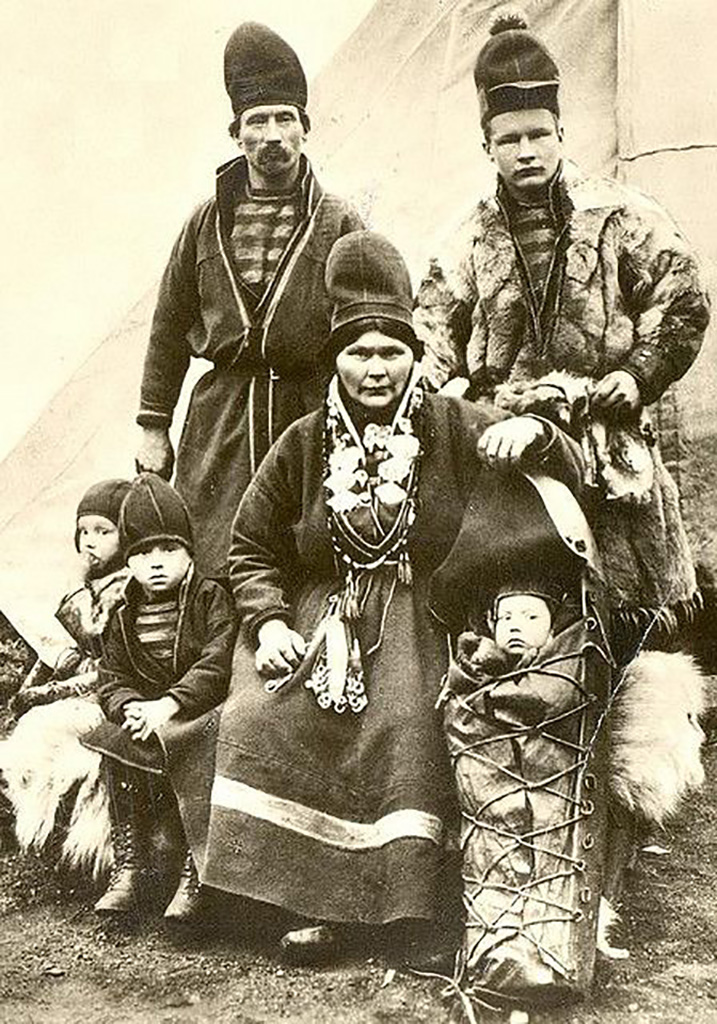



(very old photo, colorized)
You may appreciate taking a moment to note the unique folk clothing, etc., of the Sámi people, Norway's (and Sweden's) native population:
https://tinyurl.com/64hwts5j
Wikipedia information regarding the Sámi:
https://en.wikipedia.org/wiki/S%C3%A1mi_people
~ ~ ~
Sweden’s Troubled Relationship With The Indigenous Sámi Community
January 21, 2021 Pallavi Chatterjee
THE INDIGENOUS SÁMI COMMUNITY
Upon hearing the term “indigenous community”, one might not be blamed for thinking perhaps of the supremely well-organized and politically active Latin American tribes, or perhaps First Nations communities from Northern America who have long-standing histories of formally organizing and agitating for their fundamental rights and freedoms. Their adversaries are represented in stark terms – the unrestrained capitalist bent of their national political and economic institutions, entrenched discrimination and histories of violence, mistreatment, and disenfranchisement persisting till today.
The nomadic Sámi communities of northernmost Sweden, Norway, Finland and parts of Russia are seldom thought of in this regard. Historically referred to as “Lapps” or “Lapplanders”, Sámi historical territories (referred to as “Sápmi”)span a vast geographic region home to a variety of wildlife and extensive natural resources, where they engage primarily in reindeer-herding, fur trapping, and fishing as their sources of livelihood. The looming threat of climate change directly and disproportionately impacts their livelihoods, cultural practices and very survival itself.
The Scandinavian states are particularly well-regarded for being champions of progressive climate change actions, and are universally renowned for their relatively free and equal societies, low levels of inequality, and the reliable and well-demonstrated distributive benefits of their social democratic political and economic systems. What is less known is the legacy of aggressive forced assimilation in the name of sovereignty between southern-dwelling Scandinavians and northern-dwelling Sámi populations throughout the 1800s – alarmingly similar to the treatment faced by First Nations tribes. What is even less acknowledged is the deleterious impact of present-day environmental projectsconducted within Sápmi territories in the name of “fighting climate change”.
While evaluating any institution for the efficacy of its actions on a holistic scale, however, it is always the voices of its most marginalized and its most vulnerable populations that provide the inconvenient truths that must also be included within such claims.
. . .
HISTORICAL INJUSTICESAND LEGACIES OF DISCRIMINATION AND ABUSE
Indigenous communities are particularly vulnerable to repressive state actions when claims of land use and property rights are brought to the fore, since such claims ostensibly oppose goals of national development. The Inter-American Court of Human Rights has been a staunch defender of the rights of a number of Latin American indigenous communities, ruling in their favour when states proceeded with large-scale industrial projects on their lands without their consent. An emerging concept within international law pertains specifically to the “special relationship”indigenous communities have with their lands, which must be respected by states and the pretext to which consultations with local stakeholders must be conducted in good faith before the initiation of any projects on their lands which might have an impact on their lives and livelihoods.
Centuries of well-documented discrimination, abuse, and mistreatment of Sámi populations exist, and remains scarcely acknowledged on a global scale. The UN Racial Discrimination Committee (2011) has issued a number of recommendations to Norway and Sweden, criticizing their policies of forcibly assimilating Sámi populations and condemning language as a basis for discrimination. "Swedification" policies of the 1800s persisted well into the 1970s, based on the premise of Sámi populations being “backwards” and “uncivilized”, resulting in forced Christianisation, segregated schooling, banning the use of local languages, and “encouraging” civilized norms – often through force. 17th century Sámi who refused to give up their traditional beliefs in favour of Christianity were threatened with fines, imprisonment and even the death penalty.
More:
https://www.humanrightspulse.com/mastercontentblog/swedens-troubled-relationship-with-the-indigenous-smi-community
Scientists Gain Insights into the Ecology of Brazilian Fishing Jaguars
By Precious Smith Oct 18, 2021 07:10 PM EDT
Researchers from Oregon State University and a group of international experts have uncovered new information about a group of Brazilian jaguars' food, population density, and social interactions.

(Photo : Getty Images)
Ecology of Jaguars
Jaguars in a remote marsh area of Brazil eat mostly fish and aquatic reptiles, making them the first jaguar population known to eat just fish and reptiles. Jaguars were also seen playing, fishing, and traveling together thanks to motion-activated video cameras.
According to Charlotte Eriksson, a doctoral student at Oregon State University and head author of the article, the findings contradict popular perception that jaguars are solitary mammals whose social interactions are limited to courtship and territorial battles.
The study was conducted in a seasonally flooded protected region in the northern part of the Brazilian Pantanal, the world's largest freshwater wetland. In these locations, fishing is prohibited. There are no roads or human settlements in the area, and cattle ranching is prohibited as well.
It's a difficult place to work because of the waterlogged condition of the area, as well as the fact that researchers must cover themselves from head to toe owing to an abundance of biting insects.
. . .

More:
https://www.natureworldnews.com/articles/47879/20211018/scientists-gain-insights-ecology-brazilian-fishing-jaguars.htm
Brazil's Pantanal.


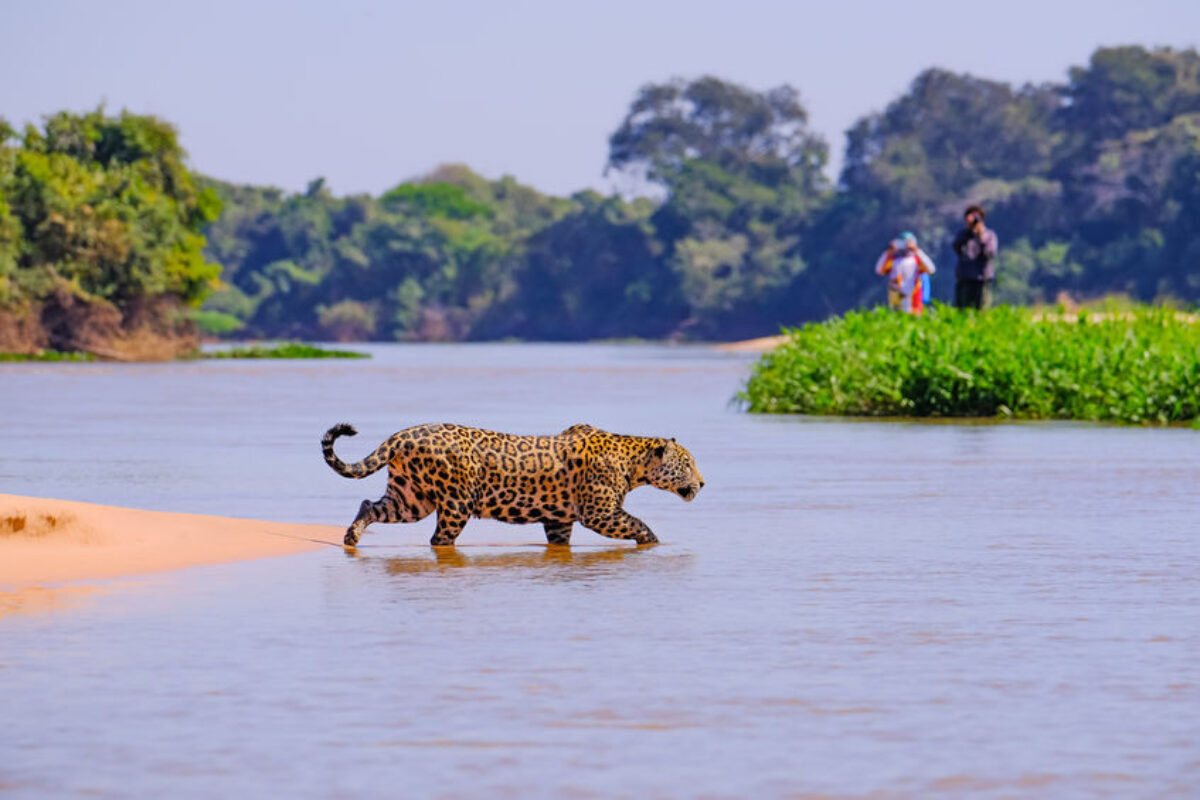
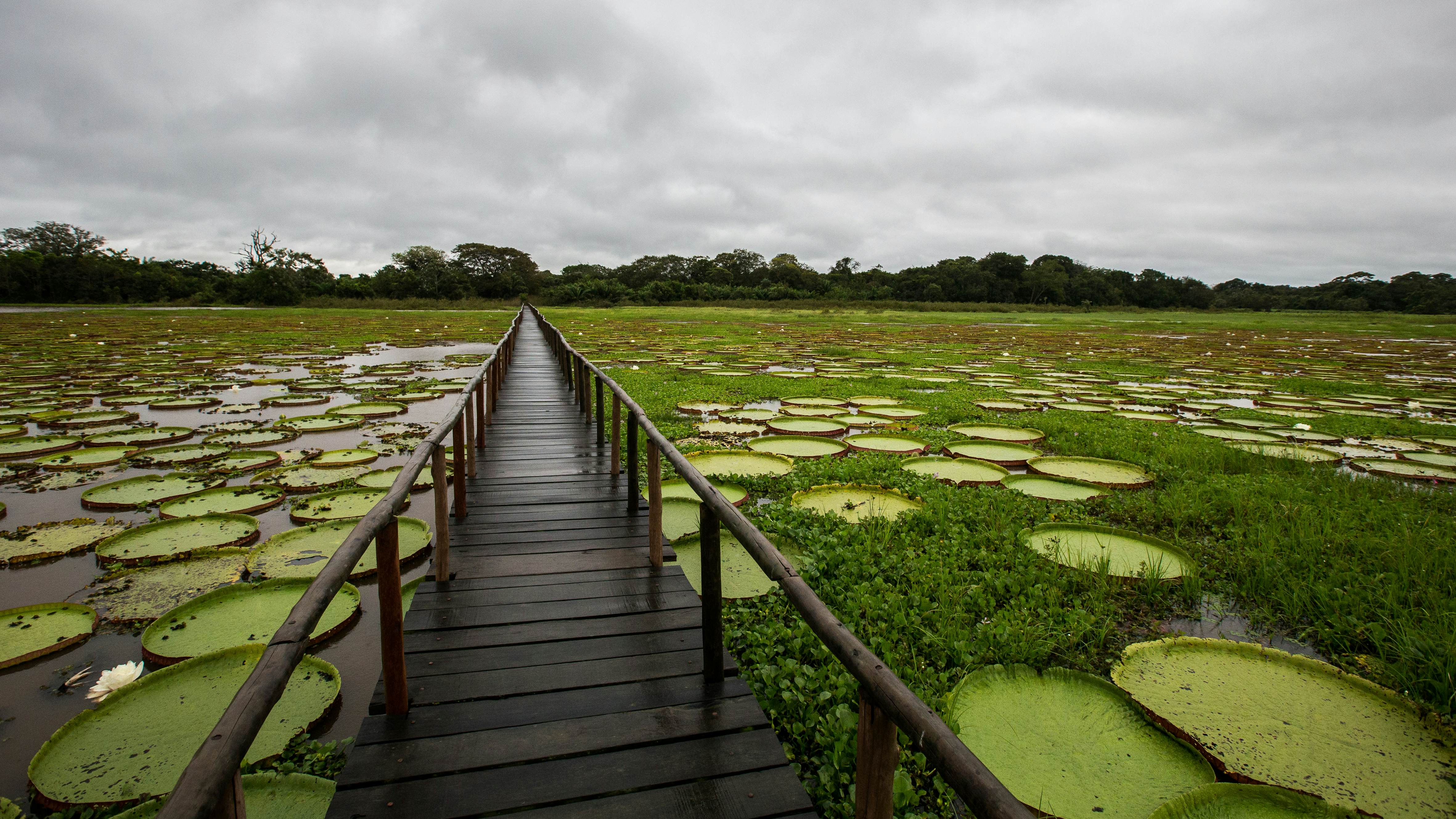

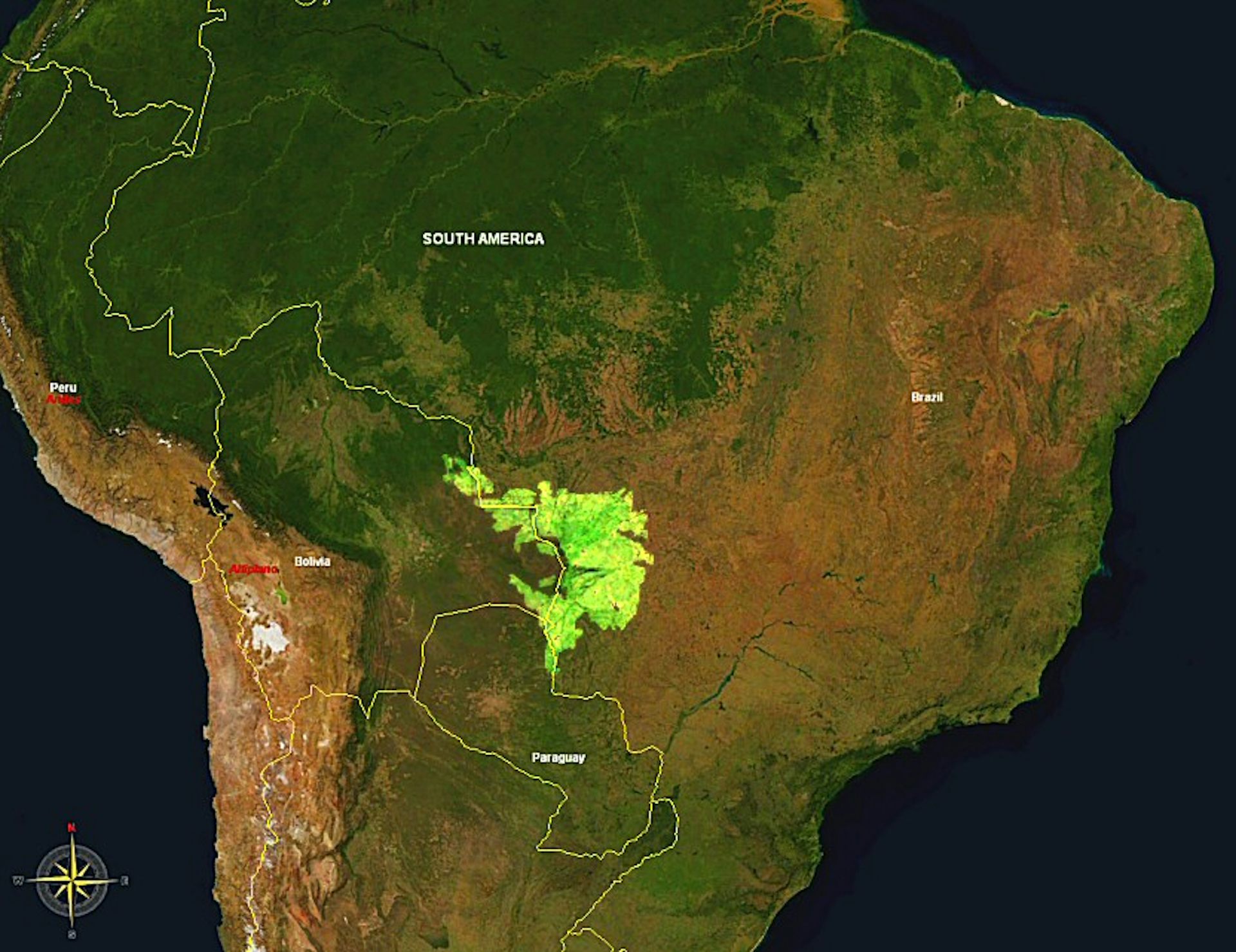



(Around 30 minutes)
~ ~ ~
Brazil Is Burning—and President Bolsonaro’s ‘Terminator’ Environment Minister Is Rolling Back More Protections
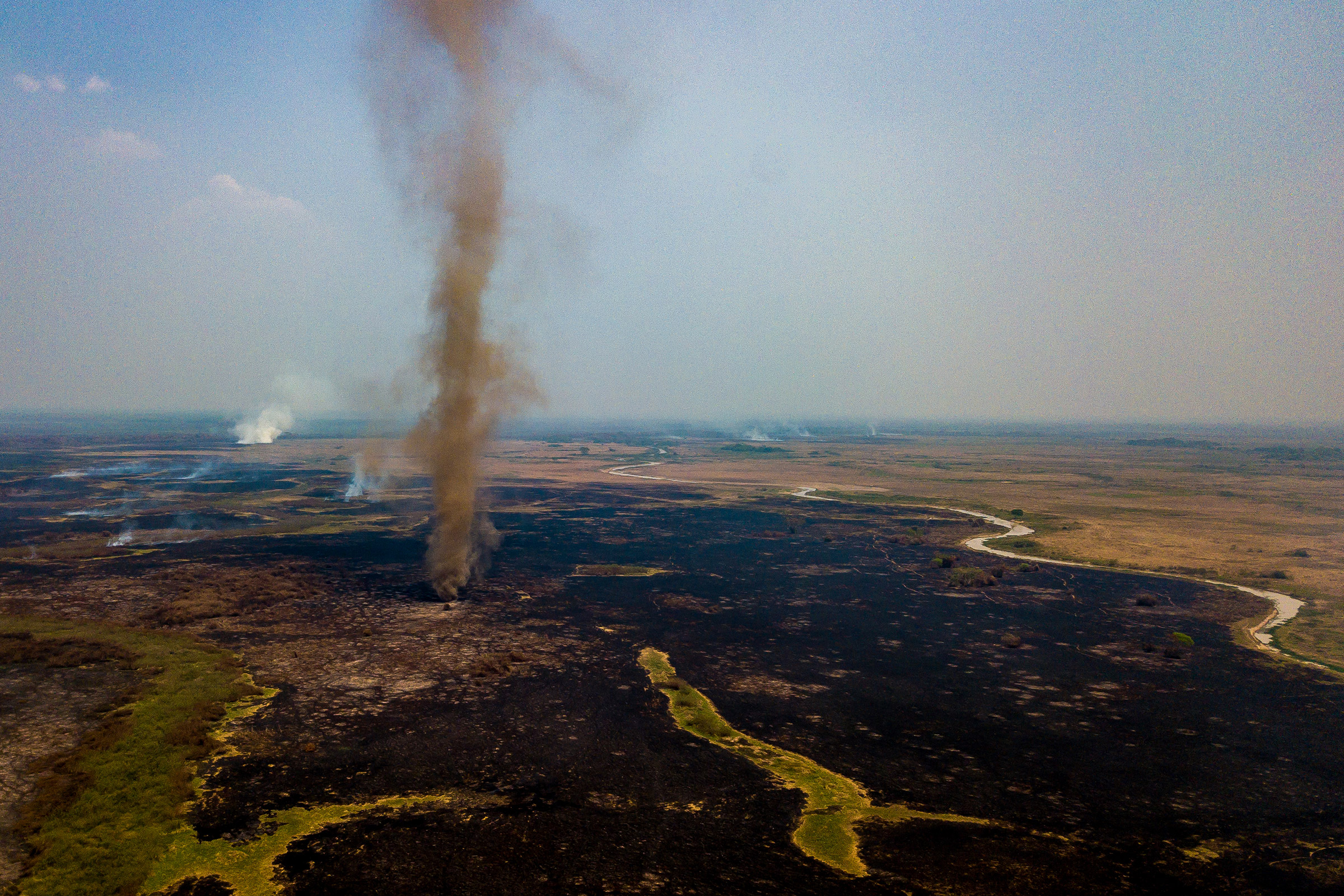
An aerial view in Pocone, Brazil, of smoke rising during a fire in the Pantanal wetlands on Sept. 24, 2020.
Buda Mendes—Getty Images
BY CIARA NUGENT
OCTOBER 1, 2020 3:57 PM EDT
Letícia Larcher has had a tough year. As technical coordinator at a conservation institute in western Brazil’s vast Pantanal wetlands, Larcher has spent 2020 dealing with a record spate of wildfires which have destroyed a staggering 22% of the Pantanal—an area about 12 times the size of Rhode Island packed with rare wildlife including jaguars and macaws. She’s also watched another devastating fire season tear through Brazil’s share of the Amazon rainforest, the worst in a decade.
And to cap it all, on Monday, Brazilian environment minister Ricardo Salles added another of the country’s unique landscapes to Larcher’s list of concern. Salles announced an end to two legal protections for mangroves and coastal restinga forests, arguing the protections were “excessively restrictive” and “stifled economic development.”
His decision was quickly suspended by a federal court, after a lawsuit was filed arguing it violates Brazilians’ constitutional right to an ecologically balanced environment. Still, the move opened a new battle ground in one of the most bitterly-fought wars raging in Brazil under far-right President Jair Bolsonaro.
“It’s very frustrating,” Larcher says, noting that she studied mangroves and restinga forests for her doctorate before joining conservation efforts in the Pantanal. Both consist of shrubby, hardy plants that scientists consider vital to protecting land from coastal erosion, sheltering biodiversity and sequestering carbon from the atmosphere to slow the greenhouse effect. ”Salles is the environment minister: his role is to take decisions for the environment, not for other groups.”
It’s not exactly unexpected from Salles, who is nicknamed ‘The Terminator’ among Brazilian climate activists. Appointed by Bolsonaro in December 2018, the 45-year-old has led a decisive campaign to overhaul Brazil’s environmental institutions and relax regulations.
More:
https://time.com/5895167/brazil-fires-ricardo-salles-environment/
Court finds Colombia responsible for rape and torture of journalist Jineth Bedoya
A court has found that the Colombian state bears responsibility for the kidnap, rape and torture of journalist Jineth Bedoya by right-wing paramilitaries in 2000.
Agence France-Presse
San Jose
October 19, 2021UPDATED: October 19, 2021 08:02 IST
The Inter-American Court of Human Rights on Monday ruled that the state of Colombia bears "responsibility" for the ordeal of a female journalist who was kidnapped, raped and then tortured in 2000 by paramilitaries.
. . .
She was investigating a weapons smuggling ring at the prison when she was abducted.
At the court hearing, she implicated agents of the state, in particular an "influential" general of the police force.
The acts "could not have be carried out without the consent and collaboration of the State, or at least with its tolerance," the Court ruled on Monday.
More:
https://www.indiatoday.in/world/story/jineth-bedoya-court-finds-colombia-responsible-for-rape-torture-1866375-2021-10-19
Reintegration of Colombia's former guerrillas threatened: UN
by Adriaan Alsema October 15, 2021
The reintegration of demobilized FARC guerrillas is being threatened by ongoing violence and the failure of Colombia’s government to provide farmland, the United Nations said Thursday.
Speaking before the UN Security Council, mission chief Carlos Ruiz urged the government of President Ivan Duque to fully implement the 2016 peace deal.
The government’s selective implementation is “insufficient to deactivate the factors that underpinned decades of armed conflict and to achieve the Agreement’s transformative potential,” said Ruiz.
The UN chief stressed that attacks on former FARC fighters and failures to implement the peace deal are threatening the reintegration of the 13,000 former guerrillas who are taking part in the peace process.
More:
https://colombiareports.com/reintegration-of-colombias-former-guerrillas-threatened-un/
~ ~ ~
Such a tragically familiar story, extending generations into the past, as previous dissidents, or suspected dissidents, or supporters of human rights are repeatedly assassinated while trying to live in peace, assassinated by death squads operating at the direction of right-wing politicians, or military officials. The members of some paramilitary groups (death squads) are often previous military people.)
Profile Information
Member since: 2002Number of posts: 160,501